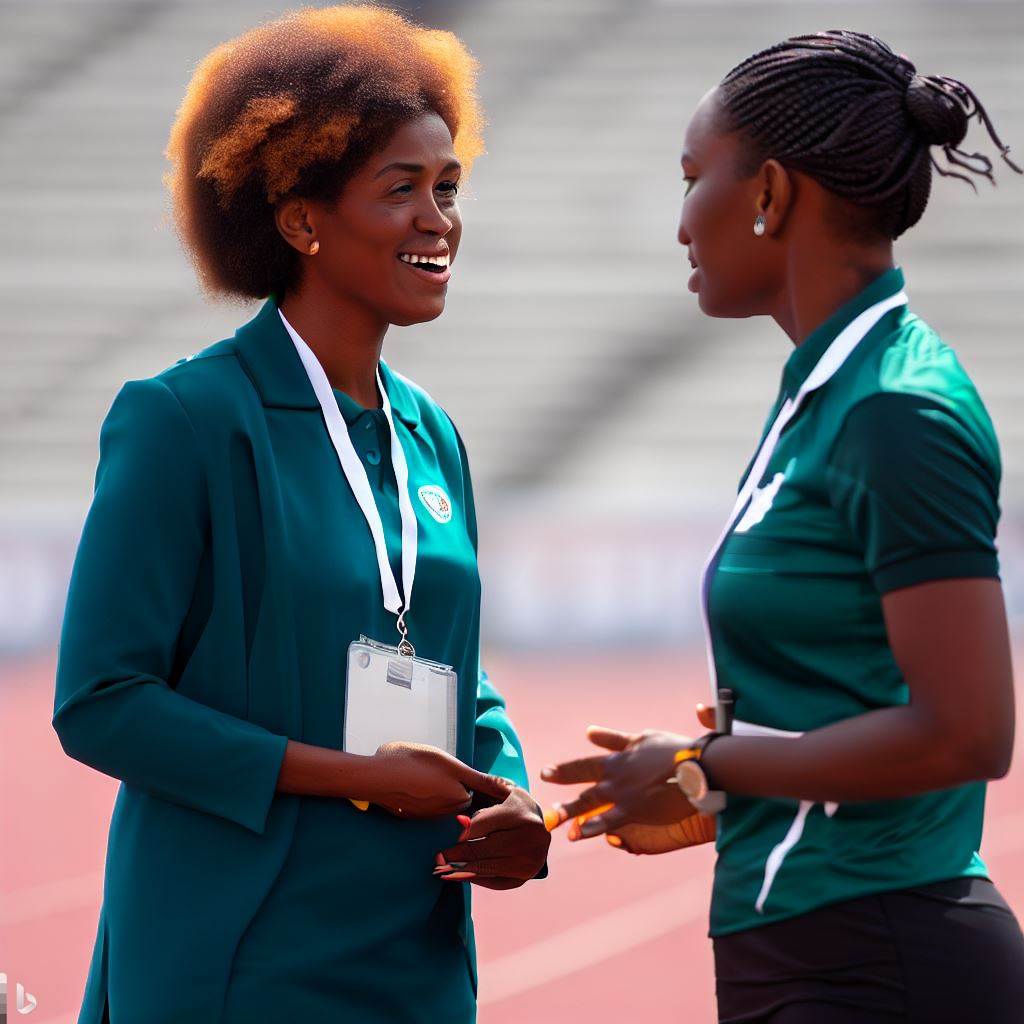Introduction
Salary Insights: Assistant Coaches in Nigeria 2023.” In this edition, we delve into the intriguing topic of Assistant Coaches’ Salary in Nigeria, shedding light on current trends and prospects.
Salary insights provide valuable information on salaries and their significance in various industries.
Assistant coaches play an essential role in the Nigerian sports industry, supporting head coaches in training and strategy.
Explanation of Salary Insights and their Importance
- Salary insights provide crucial data on compensation in various industries, shedding light on earning potential.
- For assistant coaches in Nigeria, these insights are invaluable for career planning and financial security.
- Understanding salary ranges helps individuals negotiate fair compensation packages.
- It aids employers in making competitive offers, ensuring they attract and retain top coaching talent.
- Salary insights reflect market trends, which can impact career decisions and job satisfaction.
- They empower assistant coaches to make informed choices regarding job opportunities.
- Moreover, these insights can help with budgeting, savings, and long-term financial planning.
- Access to reliable salary data fosters transparency in the coaching profession.
Brief Overview of Assistant Coaches in Nigeria
- Assistant coaches play pivotal roles in Nigerian sports, supporting head coaches in various disciplines.
- They assist in player development, strategy implementation, and overall team performance enhancement.
- Nigeria boasts a rich sports culture, excelling in football, basketball, athletics, and more.
- Consequently, the demand for qualified assistant coaches is steadily increasing.
- These professionals require a deep understanding of their sport, excellent communication skills, and leadership abilities.
- Assistant coaching roles can vary widely in responsibilities and requirements across sports.
- In football, for instance, they may focus on specific positions or aspects of the game.
- Salary insights specific to Nigeria’s assistant coaching positions help aspiring coaches navigate their careers effectively.
In this section, we’ve explored the significance of salary insights and offered a glimpse into the world of assistant coaches in Nigeria, setting the stage for a deeper dive into their compensation in the following chapters.
The Role of Assistant Coaches in Nigerian Football
Assistant coaches’ duties and responsibilities
- Assist head coaches in planning and organizing training sessions.
- Provide guidance and support to players during practice and matches.
- Analyze opponents’ strategies and develop game plans to counter them.
- Help in talent scouting and recruitment of promising players.
- Collaborate with the medical staff to manage player injuries and rehabilitation.
- Conduct individual player assessments to identify areas for improvement.
- Contribute to the development of team tactics and formations.
- Supervise and mentor young coaches, promoting their professional growth.
- Facilitate effective communication and teamwork within the coaching staff.
- Assist in creating a positive and motivating environment for the players.
Importance of assistant coaches in player development and team management
- Assistant coaches play a vital role in developing players’ skills and abilities.
- They provide individual attention and guidance to help players reach their full potential.
- Assistant coaches contribute to the overall team management and coordination.
- They assist in maintaining discipline and enforcing team rules.
- Assistant coaches offer different perspectives and ideas, enhancing the team’s decision-making process.
- They help in building team chemistry and fostering a positive team culture.
- Assistant coaches support the head coach in handling the pressure and workload.
- They serve as intermediaries between the players and the head coach.
- Assistant coaches provide valuable feedback and evaluations to improve player performance.
- They contribute to building a strong and competitive team that consistently achieves success.
Comparison between head coaches and assistant coaches in terms of responsibilities
While head coaches have the ultimate responsibility for the team’s performance and results, assistant coaches have their unique roles and responsibilities.
- Head coaches are responsible for overall team management and decision-making.
- Assistant coaches focus on specific areas such as training, player development, and tactical analysis.
- Head coaches establish the team’s playing style and strategies.
- Head coaches have the final say in team selection and substitutions.
- Assistant coaches provide input and recommendations based on their expertise and observations.
- Head coaches bear the brunt of media and public scrutiny.
- Assistant coaches support head coaches behind the scenes, providing valuable expertise and support.
- Head coaches handle most of the communication with players, staff, and club management.
- Assistant coaches contribute to effective internal communication and coordination within the coaching staff.
Essentially, assistant coaches in Nigerian football have essential roles in player development, team management, and overall success.
Their duties and responsibilities complement those of head coaches, and their contributions are vital in creating a strong and competitive team.
Read: Youth Programs: Athletic Directors Shaping Nigeria’s Talent
Surveying Assistant Coaches’ Salaries in Nigeria
Gathering data on assistant coaches’ salaries
- Defining the purpose and scope of the salary survey.
- Identifying the target population – assistant coaches working in Nigerian sports clubs.
- Developing a questionnaire to collect relevant salary data.
- Distributing the questionnaire to assistant coaches in various sports clubs.
- Ensuring confidentiality and anonymity to encourage honest responses.
- Setting a deadline for the completion of the survey to expedite data collection.
Methodology used for conducting the salary survey
- Designing a comprehensive questionnaire with specific salary-related questions.
- Ensuring the questionnaire is user-friendly and easy to understand.
- Using a combination of online and offline methods to distribute the survey.
- Implementing a stratified sampling technique to ensure representation from different sports clubs.
- Applying statistical analysis to interpret the collected data accurately.
General findings and trends regarding assistant coaches’ salaries in Nigeria
- The average salary of assistant coaches in Nigeria is significantly lower compared to head coaches.
- Most assistant coaches earn between N300,000 to N600,000 per month.
- Assistant coaches in professional football clubs tend to earn higher salaries than those in other sports.
- Salaries vary based on qualifications, experience, and the success of the sports club.
- The majority of assistant coaches receive additional benefits like housing allowances and medical insurance.
- Female assistant coaches often face gender-based salary discrimination, earning less than their male counterparts.
- Assistant coaches with advanced coaching certifications and international experience demand higher salaries.
- There is a lack of transparency in salary negotiations, with coaches often relying on personal connections.
- Opportunities for salary growth for assistant coaches are limited, especially in smaller sports clubs.
- The salary disparity between Nigerian assistant coaches and their counterparts in developed countries is significant.
In essence, the survey highlights the current salary landscape for assistant coaches in Nigeria.
It reveals that assistant coaches face challenges in terms of low salaries, gender-based discrimination, and limited career growth.
To improve the situation, sports clubs and governing bodies must address these issues by creating fairer salary structures, promoting gender equality, and providing more opportunities for professional development.
Only by doing so can Nigeria maximize the potential of its assistant coaches and elevate the standards of its sports industry.
Factors Influencing Assistant Coaches’ Salaries
Determining the salaries of assistant coaches in Nigeria in 2023 involves a complex interplay of critical factors.
These variables significantly impact both the financial remuneration these coaches receive and their career prospects.
In this segment, we will delve into the pivotal factors that shape the compensation landscape for assistant coaches in Nigeria.
Level of coaching experience and qualifications
An assistant coach’s salary is inherently linked to their coaching experience and qualifications.
Coaches boasting extensive experience and higher-level certifications tend to command more substantial salaries.
Their seasoned expertise and established track records, often honed through collaborations with successful teams, make them highly sought-after assets in the coaching realm.
Assistant coaches who have invested in coaching certifications and specialized training also tend to secure more attractive compensation packages.
These additional qualifications underscore a commitment to ongoing professional development and a fervor for enhancing their coaching prowess.
Consequently, coaches with advanced certifications are better positioned to engage in successful salary negotiations.
Team’s performance and success rate
The performance and success rate of the team an assistant coach is affiliated with can wield considerable influence over their salary.
Coaches associated with consistently high-performing teams, those that clinch championships and achieve enduring success, often find themselves in high demand.
This demand can translate into more favorable compensation terms.
Successful teams typically attract attention from media, sponsorships, and investors, leading to augmented financial resources.
Consequently, these teams can afford to offer more competitive salaries to their coaching staff.
Assistant coaches who actively contribute to a team’s accomplishments through effective strategies and player development plans are more likely to reap financial rewards.
Availability of financial resources and budget constraints
The financial resources available to a team or organization, alongside their budgetary constraints, significantly influence assistant coaches’ salaries.
Some teams operate with limited financial means and must adhere to budgetary constraints when determining compensation.
In such scenarios, assistant coaches may need to accept lower salaries due to the financial restrictions in place.
Conversely, teams endowed with more substantial financial resources may possess greater flexibility when it comes to salary negotiations.
These well-funded teams are willing to invest more in their coaching staff, thus being inclined to offer more generous compensation packages.
The financial stability and resource pool of a team or organization are pivotal determinants of assistant coaches’ salaries.
Influential role of agents and negotiations
Agents and the art of negotiation play a pivotal role in shaping assistant coaches’ salaries.
Accomplished agents specializing in sports coaching contracts employ their expertise to secure advantageous agreements for their clients.
These skilled negotiators advocate on behalf of coaches, taking into account their skills, experience, and market value.
Agents engage in negotiations with team management to arrive at mutually beneficial arrangements.
Through astute negotiations, agents can secure higher salaries, performance-based bonuses, and other perks for assistant coaches.
An agent’s adeptness in effectively representing their clients can often be the decisive factor in determining an assistant coach’s salary.
In summary, assistant coaches’ salaries in Nigeria in 2023 are subject to a myriad of influences.
The level of coaching experience and qualifications, the team’s performance and financial backing, budget constraints, and the influential role of agents and negotiations all collectively shape these salaries.
By comprehending these multifaceted factors and their implications, assistant coaches can navigate their career trajectories and negotiate compensation packages that aptly reflect their worth and contributions to their team’s success.
Read: Strength Coaching: A Women’s Perspective in Nigeria

Potential Changes in Assistant Coaches’ Salaries for 2023
Projected economic growth and its impact on salaries
- The Nigerian economy is projected to experience growth in 2023.
- This growth could have a positive impact on assistant coaches’ salaries.
- With a stronger economy, sports clubs may be able to allocate more funds to coaching staff.
- Assistant coaches could benefit from increased budgets and higher salary offers.
- The projected economic growth provides a favorable environment for potential salary increases.
Analysis of recent trends in coaching salaries
- Over the past few years, salaries for assistant coaches in Nigeria have shown an upward trend.
- There has been an increased focus on investing in coaching staff to improve team performance.
- Successful results have led to a recognition of the importance of assistant coaches in achieving success.
- As a result, clubs have been more willing to invest in the salaries and benefits of their coaching staff.
- This trend indicates a positive outlook for potential salary changes in the coming year.
Predictions for potential salary changes in the coming year
- Based on the projected economic growth and recent trends, assistant coaches can expect potential salary increases in 2023.
- The demand for high-quality coaching staff will likely drive competition among sports clubs.
- This competition can lead to higher salary offers to attract and retain top assistant coaches.
- Assistant coaches with a proven track record and successful coaching experience may have an advantage.
- Additionally, the growing popularity of sports in Nigeria may also contribute to increased salaries for coaching staff.
- The rise of sponsorships and broadcasting rights can generate additional revenue for clubs, allowing them to invest more in salaries.
- It is essential for assistant coaches to stay updated on market trends and negotiate fair compensation packages.
- With the right qualifications and skills, assistant coaches can position themselves for higher salaries and better opportunities.
Overall, the combination of projected economic growth, recent trends in coaching salaries, and the increasing demand for high-quality coaching staff indicates potential salary changes for assistant coaches in Nigeria in 2023.
While nothing can be guaranteed, the positive outlook suggests that assistant coaches may see an increase in salaries, benefiting from a stronger economy and the recognition of their essential role in sports success.
Read: Creating a Brand: Strength Coaching in Nigeria
Challenges and Opportunities for Assistant Coaches in Nigeria
Challenges faced by assistant coaches in terms of compensation
- Limited financial resources for sports development pose a significant challenge for assistant coaches in Nigeria.
- Assistant coaches often face lower salaries compared to head coaches, despite shouldering similar responsibilities.
- Lack of uniformity in salary structures across different sports organizations can create disparities in compensation.
- Inadequate government funding and sponsorship deals in Nigerian sports result in limited financial support for assistant coaches.
- In some cases, assistant coaches are not recognized or appreciated enough, which can impede their compensation growth.
Opportunities for career growth and increased salaries
- Expanding sports infrastructure and development programs in Nigeria create opportunities for assistant coaches to excel.
- Collaborating with international coaches or participating in exchange programs can enhance the knowledge and skills of assistant coaches.
- The emergence of new sports leagues and competitions in Nigeria offers chances for assistant coaches to showcase their expertise.
- Leveraging technology advancements in sports training and analysis can provide assistant coaches with growth opportunities.
- Networking with influential individuals in the sports industry can lead to better career prospects and increased salaries.
Suggestions for assistant coaches to improve their marketability and earning potential
- Continuous professional development through attending coaching seminars, workshops, and certification programs.
- Building a strong network within the sports industry by attending conferences and connecting with other coaches.
- Developing expertise in specific areas of coaching, such as strength and conditioning, sports psychology, or analytics.
- Seeking mentorship from experienced coaches who can guide assistant coaches in advancing their careers.
- Proactively negotiating contracts and advocating for fair compensation based on their qualifications and contributions.
- Increasing visibility by volunteering or assisting in coaching camps, academies, and national team programs.
- Creating an online presence through websites or social media platforms to showcase coaching achievements and attract potential opportunities.
Ultimately, assistant coaches in Nigeria face challenges related to compensation due to limited resources and disparities in salary structures.
However, there are also several opportunities for career growth and increased salaries, such as leveraging sports infrastructure development, collaborating with international coaches, and exploring new sports leagues.
To improve their marketability and earning potential, assistant coaches can focus on continuous professional development, networking, specialization, mentorship, contract negotiation, visibility, and online presence.
By actively pursuing these suggestions, assistant coaches can navigate the challenges and harness the opportunities in Nigeria’s coaching landscape.
Read: Training Tools: Nigerian Strength Coach Guide
Explore Further: Networking for Fitness Nutritionists in Nigeria
Conclusion
Recap of the importance of salary insights for assistant coaches in Nigeria
Throughout this blog post, we have emphasized the significance of salary insights for assistant coaches in Nigeria.
It is crucial for these professionals to be aware of the prevailing compensation trends in order to make informed decisions and negotiate fair salaries for their services.
By understanding the average pay ranges and market demand, assistant coaches can ensure they are adequately compensated for their valuable contributions to the sports industry.
Summary of the key findings and predictions for 2023
Our research has revealed several key findings and predictions regarding the salaries of assistant coaches in Nigeria by 2023.
We have observed a steady growth in salary rates in recent years, and this trend is expected to continue in the coming years.
With the increasing popularity of sports in Nigeria and the professionalization of coaching roles, assistant coaches can anticipate an upward trajectory in their earning potential.
Final thoughts on the significance of fair compensation for assistant coaches
In summary, it is essential to recognize and prioritize fair compensation for assistant coaches in Nigeria.
These individuals dedicate their time, expertise, and passion to developing athletes and contributing to the success of sports teams.
By providing them with fair salaries, we can attract and retain top coaching talent in the country, ultimately enhancing the overall quality and competitiveness of Nigerian sports.
In order to ensure proper compensation, salary insights and market research must be regularly conducted to keep up with changing dynamics.
This will allow assistant coaches to advocate for their worth and contribute to a thriving sports ecosystem in Nigeria.
Fair compensation not only benefits the coaches themselves but also promotes professionalism and a sustainable future for sports development in the country.
Let us continue to prioritize the value of assistant coaches and their rightful compensation for a successful Nigerian sports industry in 2023 and beyond.




